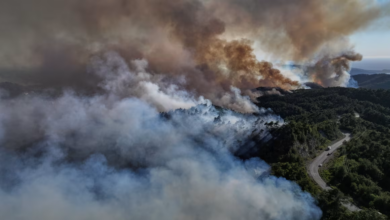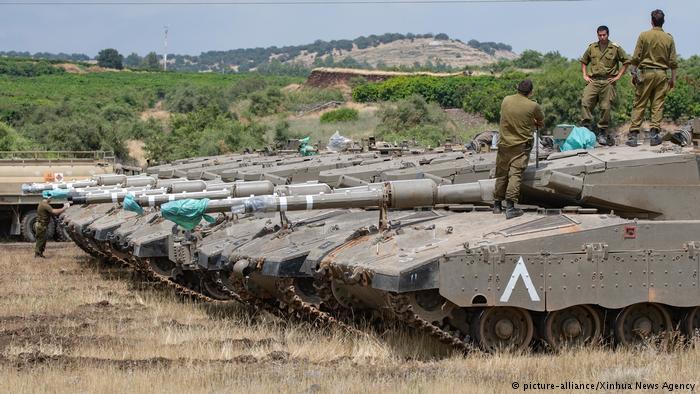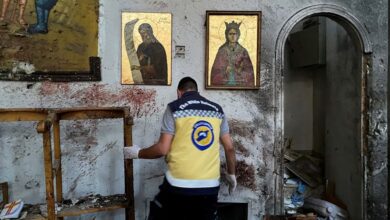
On the outskirts of the Syrian Christian town of Sadad, children play in front of a cannon fired just hours ago in an ongoing battle against the Islamic State group.
Soldiers and pro-regime militiamen nearby look on with amusement at the children, who appear oblivious to the fact that their ancient town is now in the sights of the jihadist group.
Sadad is majority Syriac Orthodox Christian, and it is believed to be the same town referred to as Zedad in the Old Testament's "Book of Kings".
Its ancient churches have been caught in the crossfire before, with regime and rebel forces battling for control of the town in October 2013.
Regime forces eventually secured the town, but IS is not far away and many residents have fled.
"Around 60 percent of the 12,000 residents, particularly the women and children, have fled to other Christian villages in the province, like Fayruza and Yazdal," said Suleiman Khalil, Sadad's mayor.
"The men are staying behind to defend the town," added Khalil, in his 30s, working a rosary through his fingers as he walked.
IS already controls several towns and villages in Homs province, including the famed city of Palmyra, home to ancient ruins that the group has systematically destroyed.
It also holds the town of Al-Qaryatain, where its fighters kidnapped hundreds of civilians including Christians, and blew up an ancient monastery.
Just 10 km away
On November 1, the jihadist group reached Maheen, just 10 km (6 miles) east of Sadad.
They have since fired dozens of mortar shells at Sadad, killing both civilians and local fighters.
The advance has left much of the town empty and residents afraid of what may come next.
"We are afraid of massacres but we are also afraid for our churches because the Islamic State group has already blown up religious monuments in areas it has captured," one local resident told AFP.
IS has launched a campaign of destruction against buildings and monuments that fall outside its harsh interpretation of Islam, ranging from Christian churches to Muslim graves, as well as ancient treasures like the temples of Palmyra.
"We are threatened by Daesh because of our religion," said 22-year-old Hassan, a shopkeeper who has taken up arms to defend Sadad, using the Arabic acronym for the group.
"They threaten the whole world. We are staying here to defend the town and prevent the tragedies and massacres that happened in other Christian villages from occurring here."
Preparing for battle alongside residents are two militias, including a contingent from the so-called Sotoro force (Syriac for protection).
The Sotoro is a Syriac Christian militia based in the northeastern province of Hasakeh, which has dispatched some 250 fighters to held defend Sadad.
Photos with Russian advisors
"We came here to be by the side of the regular army and support them in their fight against Daesh," said 26-year-old Sotoro fighter Badie.
"We're here to defend all Syrians in general, and our Christian brothers in particular," he added.
He said IS would "commit massacres" if it was able to enter the town.
"We are ready to repel any offensive," he said confidently.
The Sotoro forces fight alongside villagers as well as gunmen from the "Eagles of the Storm," an armed wing of the Syrian Social Nationalist Party, a pro-regime political group.
Six of the "Eagles" were killed recently when an IS suicide bomber in a car blew himself up at a checkpoint manned by the force just outside the town.
Food for the militiamen is prepared in a large hall near the municipality by volunteers who wear vests bearing the logo "Contributed by the Youth of Sadad."
Syrian army troops are mostly stationed outside the town, where Russian forces are also present, according to local sources.
The Russians are mostly present in an airport between Maheen and Sadad, with a military source describing them as "advisers" assisting Syrian forces in their bid to recapture Maheen.
They have also made appearances inside Sadad, with some treating them like celebrities.
"The Russian advisers have been seen in town and some people have taken pictures with them as souvenirs," one resident told AFP, holding up his own photo as evidence.




